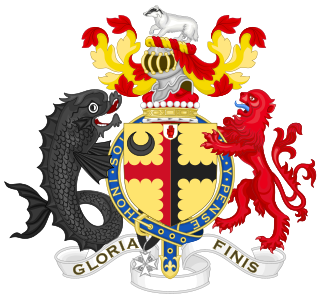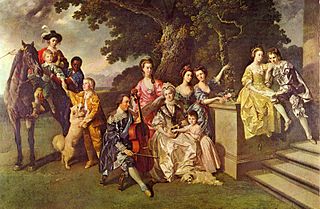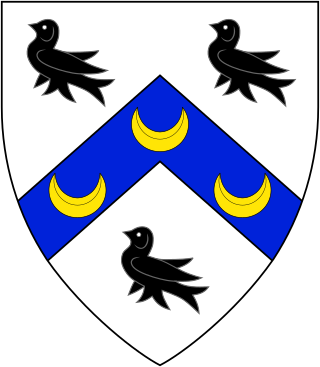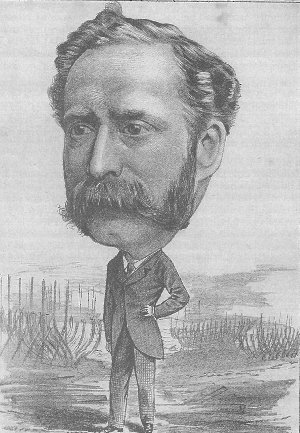
Earl of Lonsdale is a title that has been created twice in British history, firstly in the Peerage of Great Britain in 1784, and then in the Peerage of the United Kingdom in 1807, both times for members of the Lowther family.

Earl St Aldwyn, of Coln St Aldwyn in the County of Gloucester, is a title in the Peerage of the United Kingdom. It was created in 1915 for the prominent Conservative politician Michael Hicks Beach, 1st Viscount St Aldwyn, known from 1854 to 1907 as Sir Michael Hicks Beach, 9th Baronet, of Beverston. He was Chancellor of the Exchequer from 1885 to 1886 and again from 1895 to 1902. Hicks Beach had already been created Viscount St Aldwyn, of Coln St Aldwyn in the County of Gloucester, in 1906, and was made Viscount Quenington, of Quenington in the County of Gloucester, at the same time he was given the earldom. Both titles are in the Peerage of the United Kingdom. He was succeeded by his grandson, the second Earl, the son of Michael Hicks Beach, Viscount Quenington, Member of Parliament for Tewkesbury, who was killed in action in 1916. Lord St Aldwyn was also a Conservative politician and was Captain of the Honourable Corps of Gentlemen-at-Arms between 1958 and 1964 and 1970 and 1974. As of 2018 the titles are held by his eldest son, the third Earl, who succeeded in 1992.

Viscount Brookeborough, of Colebrooke in the County of Fermanagh, is a title in the Peerage of the United Kingdom. It was created in 1952 for the Ulster Unionist politician and Prime Minister of Northern Ireland, Captain The Rt. Hon. Sir Basil Brooke, 5th Bt., P.C. (N.I.), M.P..

Baron Glentoran, of Ballyalloly in the County of Down, is a title in the Peerage of the United Kingdom. It was created on 8 July 1939 for the Unionist politician Herbert Dixon. In 1950 he also succeeded his elder brother as third Baronet, of Ballymenock. His son, the second Baron, was also a politician and served as the last Speaker of the Senate of Northern Ireland. As of 2017 the titles are held by the latter's son, the third Baron, who succeeded in 1995. He is a former Olympic bobsleigh gold medallist as well as a soldier, businessman and politician. Lord Glentoran was one of the ninety elected hereditary peers who remain in the House of Lords after the passing of the House of Lords Act 1999, and sat on the Conservative benches until his June 2018 retirement under the House of Lords Reform Act 2014.
Nineteen baronetcies have been created for persons with the surname Hamilton, eight in the Baronetage of Nova Scotia, one in the Baronetage of England, five in the Baronetage of Ireland, one in the Baronetage of Great Britain and four in the Baronetage of the United Kingdom. As of 2008 two creations are extant, two are dormant, two are either extinct or dormant and twelve extinct.
There have been three baronetcies created for persons with the surname Baillie, one in the Baronetage of Nova Scotia and two in the Baronetage of the United Kingdom. As of 2014 one creation is extant.
There have been baronetcies created for members of the Touche family from Surrey, both in the Baronetage of the United Kingdom. Both creations are extant as of 2010.

There have been five baronetcies created for persons with the surname Young, one in the Baronetage of England, one in the Baronetage of Great Britain and three in the Baronetage of the United Kingdom. As of 2014, four of the creations are extant.

There have been three baronetcies created for persons with the surname Chapman, one in the Baronetage of Great Britain, one in the Baronetage of Ireland and one in the Baronetage of the United Kingdom. Two of the creations are extinct while one is extant.

There have been twenty one baronetcies created for persons with the surname Williams, eight in the Baronetage of England, three in the Baronetage of Great Britain and ten in the Baronetage of the United Kingdom. Only six of the creations are extant as of 2017.

There have been two baronetcies created for the Guise family, one in the Baronetage of England and one in the Baronetage of Great Britain. The latter creation is extant as of 2014.
There have been four baronetcies created for persons with the surname Barlow, one in the Baronetage of England and three in the Baronetage of the United Kingdom.
There have been two baronetcies created for persons with the surname Barry, one in the Baronetage of Ireland and one in the Baronetage of the United Kingdom.
There have been five baronetcies created for persons with the surname Evans, one in the Baronetage of Ireland and four in the Baronetage of the United Kingdom. All of the baronetcies are now extinct.

There have been seven baronetcies created for persons with the surname Watson, one in the Baronetage of England, one in the Baronetage of Great Britain and five in the Baronetage of the United Kingdom. One creation is extant as of 2016.

The Brocklehurst Baronetcy, of Swythamley Park, in the parish of Rushton, in the County of Stafford and of Stanhope Terrace, Hyde Park, in the County of London, was a title in the Baronetage of the United Kingdom. It was created on 27 August 1903 for Philip Lancaster Brocklehurst. He was the youngest son of John Brocklehurst, a silk weaver and Member of Parliament for Macclesfield, the younger brother of William Coare Brocklehurst, also Member of Parliament for Macclesfield, and the uncle of John Brocklehurst, 1st Baron Ranksborough.

Sir William Pearce, 1st Baronet was a British shipbuilder, under whose management the Fairfield Shipbuilding and Engineering Company in Govan on the River Clyde became the leading shipbuilding company in the world. He was later a Conservative Party politician.
Sir William George Pearce, 2nd Baronet was a British industrialist and Conservative Party politician.
The Thursby Baronetcy, of Ormerod House in the Parish of Burnley in the County Palatine of Lancaster and of Holmhurst in the Parish of Christchurch in the County of Southampton, was a title in the Baronetage of the United Kingdom. It was created on 26 July 1887 for John Hardy Thursby, then Honorary Colonel of the 3rd Battalion, East Lancashire Regiment.
Baron Dunleath, of Ballywalter in the County of Down, is a title in the Peerage of the United Kingdom. It was created on 29 August 1892 for the businessman and former Conservative Member of Parliament for Downpatrick, John Mulholland. The Mulholland family were involved in the cotton and linen industry in Ulster in the north of Ireland. The first Baron's son, the second Baron, represented Londonderry North in the House of Commons as a Conservative. His grandson, the fourth Baron, was a member of the Northern Ireland Assembly for the Alliance Party. He was succeeded by his first cousin, the fifth Baron, who had already succeeded his father as second Baronet of Ballyscullion. As of 2017 the titles are held by the fifth Baron's son, the sixth Baron, who succeeded in 1997.











